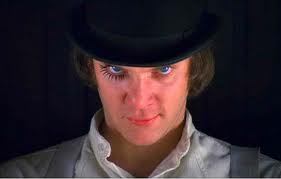First, I would like to personally thank my brilliant husband, Stephen Ray Garza who did the artwork for the picture on this review. His talent amazes me and I adore him.
Okay….onto the review: Last night, Stephen mentioned to me that the British stage play Frankenstein was being shown on the big screen at our local Rave cinema via National Theatre Live. It only took a few moments to decide we were going and to invite my mother to come along. We all needed a night out to enjoy the company of each other.
Admittedly, seeing the stage play in person would have been much more riveting, but this was the next best thing. For those unaware, National Theater Live brings the “best of British theatre” and broadcasts them to cinemas around the world.
For those unaware, National Theater Live brings the “best of British theatre” and broadcasts them to cinemas around the world.
The production opened with a short entitled “Creating Frankenstein.” Here, the lead actors Benedict Cumberbatch and Jonny Lee Miller were interviewed along with the writer Nick Dear and director Danny Boyle. The process of both the cast and crew were delved into. Footage of the 1931 classic was intertwined with scenes from the play. This most certainly makes one excited for the latest interpretation.
The play was filmed in March 2011 at the National Theatre. It was extremely well-received and won several awards including the prestigious Olivier Award for best actor where both Cumberbatch and Miller were recognized. The play was unique in the sense that the two leads switched roles each night.
At our showing, Cumberbatch portrayed the egotistical scientist Victor Frankenstein. Miller played the monster. Both did exceptionally well which really goes without saying as both are tremendous actors.
The monster is revealed in a manner nearly identical to being born. On stage sits a large circular wall, a womb of sorts, through there the monster emerges. On the floor he rolls and writhes around. Eventually, he is able to walk. He ends up in the streets of London where the citizens harass, intimidate, and cruelly treat the monster.
Eventually, he come to a farm where an old blind man (Karl Johnson) lives with his son Felix (Daniel Millar) and his beautiful daughter-n-law Agatha (Lizzy Winkler). He hides away from everyone except the blind man who teaches him how to read, speak and to think critically. The man continues to ask the monster to stay and meet his family, but the monster is sure they will react horribly. He states his fears only to be told that there is nothing to worry about. The old man swears that neither Agatha nor Felix would react harshly to him. He is certain that regardless of the monster’s looks that his family is evolved enough not to judge one on their looks. After a year, the monster finally stays but is greeted with outrage, disgust, and abuse. The old man instantly regrets his decision but is unable to talk to the monster as he runs off believing the old man has lied to him. He swears vengeance and once satisfied with his revenge, he leaves to find Victor.
Still in pain over being abandoned by his creator, he wants to find Frankenstein to demand a mate. His method of contacting Victor displays the level of insanity and rage that lives inside of him. He murders Frankenstein’s young brother William. Victor knows who the culprit is and meets the monster.
At first, he outright refuses to help but as the monster switches from stroking his ego to threatening him and back again, he relents.
 The entire plate culminates when Victor realizes that his conscience would not allow him to make a woman who could possibly be evil or provide offspring to the monster. The monster once again swears revenge and sets his eyes on Victor’s fiancé Elizabeth (Naomie Harris).
The entire plate culminates when Victor realizes that his conscience would not allow him to make a woman who could possibly be evil or provide offspring to the monster. The monster once again swears revenge and sets his eyes on Victor’s fiancé Elizabeth (Naomie Harris).
There were many aspects of the production that were well executed. It was most certainly a well-thought out and interesting premise brought to life on stage. In certain ways it was reminiscent of Clockwork Orange or the lesser known Strangeland. Just as Clockwork’s Alex (Malcolm McDowell) and Strangeland’s Captain Howdy (Dee Snyder) returned to sociopathic tendencies because of the actions of others, the monster’s initiation to rape, murder, lies, and diabolical behavior was brought upon by the citizens he encountered and the treatment he endured.
When the monster was first created he was innocent and pure. As he had no experiences, he was an empty slate. Had he not been abandoned by Victor and had he been shown love and acceptance, he may have ended up as a well-adjusted being. Instead, he developed a psychotic love/hate co-dependent relationship with Victor.
 The energy that is brought forth by the actors is phenomenal. They sell every scene. Stephen or LoveLove as I call him, has been asking me to watch Sherlock with Cumberbatch for a couple years now. It is currently on Netflix Instant Watch and for the first time I’m actually very excited about seeing it. As I am burdened with OCD (obsessive compulsive disorder) I researched Sherlock after the play and found it has won several awards and been nominated for many more. It seems like a high quality TV program that has obtained very positive reviews. Not to mention, I would love to see Cumberbatch shine in a different role as he did as Victor.
The energy that is brought forth by the actors is phenomenal. They sell every scene. Stephen or LoveLove as I call him, has been asking me to watch Sherlock with Cumberbatch for a couple years now. It is currently on Netflix Instant Watch and for the first time I’m actually very excited about seeing it. As I am burdened with OCD (obsessive compulsive disorder) I researched Sherlock after the play and found it has won several awards and been nominated for many more. It seems like a high quality TV program that has obtained very positive reviews. Not to mention, I would love to see Cumberbatch shine in a different role as he did as Victor.
That said, there were a few pieces that were overdone. There were times when the play seemed to speak down to the audience. There were verbal explanations of emotions felt that were seen without the dialogue. When the actors are of the caliber that we have with Frankenstein, the over-emphasis with Victor explaining his God complex and the monster repeating his feelings of being ostracized is redundant. Don’t get me wrong. Some of the dialogue is brilliant. Some is definitely necessary to explain the transition of emotions. There is one scene between the monster and Elizabeth where his two personalities – the sympathetic and broken man vs. the evil and diabolical monster is amazing.
Then there are other scenes where slightly political and sociological messages are being brought forth by the characters. It doesn’t cross the line of being preachy but it does fall into providing a clear voice of the writer coming from the mouth of the character and seeming a bit out of place.
 The other issue I had was the descent into darkness that the monster took. It is fully understandable that the monster would resort to awful deeds after he was hurt so badly but certain actions he did are so unforgivable that any sense of sadness one feels for the monster is destroyed. His willingness to murder or rape those that were kind, makes him into an unredeemable villain who is deserving of all the bad he encounters from then on.
The other issue I had was the descent into darkness that the monster took. It is fully understandable that the monster would resort to awful deeds after he was hurt so badly but certain actions he did are so unforgivable that any sense of sadness one feels for the monster is destroyed. His willingness to murder or rape those that were kind, makes him into an unredeemable villain who is deserving of all the bad he encounters from then on.
In the classic 1931film Frankenstein, Boris Karloff portrays the monster as a complete victim. He is never a knowing or willing victimizer or villain. As I am drawn to the old Universal Monsters, I’m always going to be looking for a villain with a heart. Creature from the Black Lagoon, Dracula, Wolfman and Karloff’s Frankenstein’s monster were the purest examples of this. The monster in the stage play however changes from extremely sympathetic to the monster everyone thought he was to begin with.
It should be stated, that I am a very big fan of the play. From start to finish, it was a captivating watch where even seated in a cinema, one had the inclination to clap.
I am elated that the great stage shows are being shown in local theaters. In this economy where people cannot often afford a luxury trip to Britain or sadly even New York to catch a Broadway play it is great to offer these shows for $15.00 a pop.
Overall Rating: 7.5/10

![frankensteinlivesmall[1] (2)](https://www.scaredstiffreviews.com/wp-content/uploads/2012/06/frankensteinlivesmall1-2.jpg)